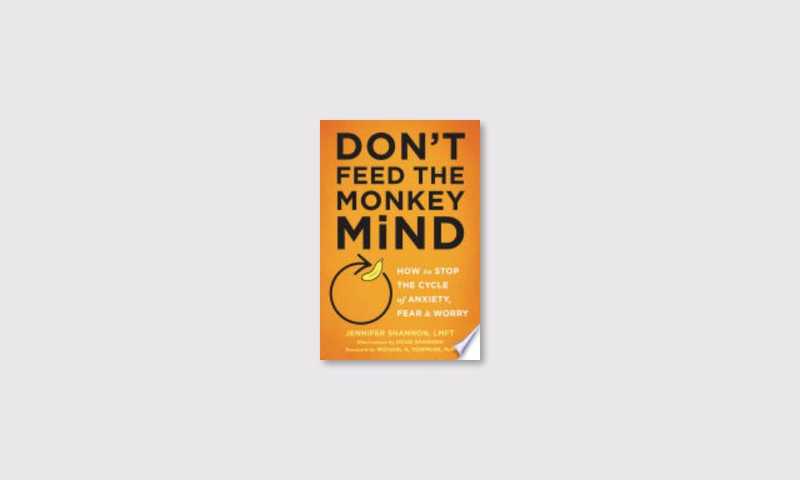
Don't Feed the Monkey Mind by Jennifer Shannon: Actionable Tips to Reduce Stress and Anxiety.
Do you find yourself constantly plagued by stress and anxiety? Do you feel like your thoughts are spiraling out of control, leaving you feeling overwhelmed and exhausted? If so, "Don't Feed the Monkey Mind" by Jennifer Shannon is a book you need to read. This practical guide is filled with actionable strategies and techniques to help you break free from the grip of anxiety and regain control over your life.
In this blog post, we will summarize the key points of "Don't Feed the Monkey Mind" and provide you with some actionable steps you can take to reduce stress and anxiety in your daily life. So, let's dive in and explore the valuable insights this book has to offer.
Taming Your Monkey Mind
Jennifer Shannon refers to the constant chatter of worry and anxiety in our minds as the "monkey mind." This metaphor is derived from the Buddhist concept of a restless, unsettled mind that jumps from one thought to another, just like a monkey swinging from branch to branch. To overcome anxiety, we must learn to tame our monkey minds and prevent them from running wild.
Here are some actionable steps from the book to help you tame your monkey mind:
1. Understand the nature of anxiety
- Anxiety is a natural, biological response to perceived threats.
- It is essential for our survival, as it prepares our body for action.
- However, when anxiety becomes chronic, it can interfere with our daily lives.
2. Become aware of your triggers
- Identify the situations, thoughts, or emotions that trigger your anxiety.
- Write them down in a journal or on a piece of paper.
- This will help you become more aware of your triggers and allow you to better manage your anxiety.
3. Practice mindfulness
- Mindfulness involves being fully present in the moment, without judgment or resistance.
- Practice mindfulness by focusing your attention on your breath, bodily sensations, or the environment around you.
- Mindfulness can help you become more aware of your thoughts and feelings, allowing you to respond to anxiety in a more constructive way.
4. Challenge your anxious thoughts
- Anxious thoughts are often irrational and exaggerated.
- Identify the specific thoughts that are causing you anxiety and then challenge their validity.
- Ask yourself whether these thoughts are based on facts or assumptions, and whether there is any evidence to support them.
5. Accept uncertainty
- Anxiety often arises from our desire for certainty and control.
- Recognize that uncertainty is a natural part of life and that it is impossible to predict or control everything that happens.
- Embrace uncertainty and learn to accept it as an opportunity for growth and learning.
6. Develop healthy coping strategies
- Replace unhealthy coping mechanisms, such as avoidance or procrastination, with healthier alternatives.
- Some examples of healthy coping strategies include deep breathing exercises, progressive muscle relaxation, meditation, and exercise.
- Experiment with different strategies to find what works best for you.
7. Set realistic expectations
- Unrealistic expectations can contribute to feelings of anxiety and stress.
- Recognize that nobody is perfect, and it is okay to make mistakes or not meet every goal you set for yourself.
- Set achievable, realistic expectations for yourself, and remember to celebrate your accomplishments, no matter how small they may seem.
8. Build a support system
- Surround yourself with people who understand and support your struggle with anxiety.
- Share your experiences and feelings with trusted friends or family members.
- Consider joining a support group or seeking professional help if necessary.
9. Take care of your physical health
- Anxiety can have a significant impact on your physical well-being, so it is essential to take care of your body.
- Maintain a balanced diet, exercise regularly, get enough sleep, and stay hydrated.
- Taking care of your physical health can help improve your mental health and reduce anxiety.
10. Practice self-compassion
- Be kind and compassionate to yourself, especially when dealing with anxiety.
- Remind yourself that it is okay to feel anxious and that you are not alone in your struggle.
- Treat yourself with the same kindness and understanding that you would offer to a friend or loved one in a similar situation.
By implementing these actionable steps from "Don't Feed the Monkey Mind," you can learn to tame your monkey mind and regain control over your life. Remember, overcoming anxiety is a journey, and it may take time and practice to see significant improvements. Be patient with yourself, and don't be afraid to seek help along the way.
In conclusion, "Don't Feed the Monkey Mind" by Jennifer Shannon is an insightful and practical guide to help you break free from the grip of anxiety. By understanding the nature of anxiety, becoming aware of your triggers, and practicing mindfulness, you can learn to tame your monkey mind and reduce stress in your daily life. With the actionable steps outlined in this blog post, you can start taking control of your anxiety and begin living a happier, more fulfilling life.